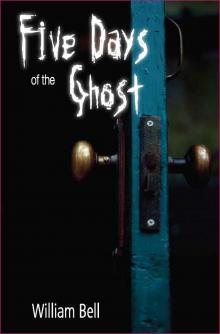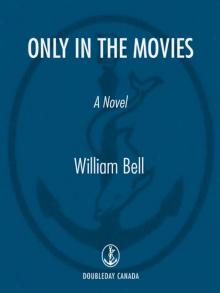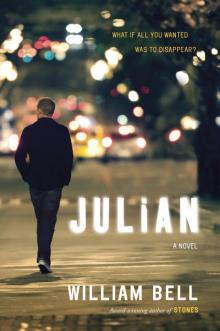- Home
- William Bell
Julian Page 5
Julian Read online
Page 5
SEVEN
THE ISTANBUL QUICKMART was ten minutes’ walk from the house. It was run by a middle-aged man named Gulun Altan and his wife, whose first name I never learned. I figured Bai owned the store, or had a stake in it, or at least something that gave Chang the leverage to get me in. Gulun scowled at me when I showed up at 7:45 the first morning but thawed out a little as he showed me my duties—which included stocking the shelves, sweeping the floor, taking out the garbage to the alley behind the building. I did my best that first day and every day after, and I could tell that both he and Mrs. Altan respected hard work.
Gulun was dark, short, pot-bellied, bug-eyed and as bald as a lacrosse ball. Every day, he wore a white long-sleeved shirt and necktie. Mrs. Altan was also short—and round—and favoured dark shapeless dresses under a smock. The Altans spoke in an accent he told me was Turkish, and both he and his wife put in long hours, sharing shifts and keeping an eye on the anti-theft mirrors hung in the ceiling corners opposite the counter. They lived in an apartment above the store.
I wasn’t allowed behind the counter, where the cash register sat beside a flat glass case full of lottery tickets. Besides the usual wide range of stuff—from milk and dry goods to newspapers and magazines to greeting cards and a thousand different kinds of sugar drinks—the Altans sold illegal cigarettes and pirated DVD movies under the counter.
A lot of the customers were regulars, picking up necessities or magazines, or a coffee from the self-serve machine beside the pop cooler. One of them was a guy who had some kind of storefront office a few doors down the street. He came in at the same time each morning for a coffee and the newspapers, always wearing either a dark blue suit or a dark grey suit with a clip-on tie, and the same black leather shoes. He had a thin moustache and a goatee.
One morning he called me over from filling the potato chip rack and told me we were out of coffee creamer. I went out back and returned with a carton of powdered creamer sachets and placed it beside the coffee machine.
“You don’t work here afternoons,” he stated, stirring the white powder into his cup with a plastic stick.
“Just mornings.”
“Mmmm.”
Unsure whether the comment applied to the coffee he had just sipped or my answer, I said nothing.
“And you look like a guy who can take care of himself.”
I shrugged.
“Think you might be interested in a little extra work?” he asked.
“I don’t know. Doing what?”
He shot a glance toward Gulun at the cash register.
“This and that,” he replied. “Odd jobs. Sometimes I could do with an extra pair of legs, you know, when I’m tied to my desk at the office.”
“What kind of office?”
“You’re very direct. I like that. And I can tell you’ve got a head on your shoulders. I practice law.”
Somehow, with his scuffed shoes and clip-on tie, he didn’t fit the image of the attorney with a dozen suits in his closet and a Mercedes parked at the curb.
“And you want me to—what?—run errands, stuff like that?”
He nodded. “Something like that. What do you say?”
He was being vague. And he was flattering me. Why not come out with what he had in mind?
“I’ll think about it,” I said.
“I pay cash. Strictly off the books,” he added with a knowing look. “Minimum wage. Name’s Curtis, by the way. And you’re Julian, right?”
I nodded. He gave me a smile that didn’t show in his eyes. “Drop in today when you’re finished here. I think we’ll work well together,” he said, and headed to the front to pay for his coffee and papers.
Some adults think people my age can be easily pushed around. A few encouraging remarks, a couple of compliments—they figure that’s all it takes to get their way. Curtis seemed to be like that. But that was okay with me. Let him think what he wanted to think. Playing hockey and lacrosse, not to mention a lifetime in social services, had taught me that it’s a big advantage sometimes when people underestimate you.
When I finished up at the store I hung my apron on a peg behind the door to the back room, said goodbye to Mrs. Altan, who didn’t look up from the order sheet she was filling out, and walked down the street to a little Italian café. I asked for a wedge of pizza and carton of milk at the counter and took my lunch to a table at the back. The pizza was lousy and usually barely lukewarm, but it was cheap. As I ate, I thought about my encounter with Curtis. Was it possible that CAS had tracked me down, that he was working for them? The thought made my stomach drop. Unlikely, I reassured myself. Very unlikely. I was being paranoid. But it wasn’t hard for someone like me—on the run, with too many secrets—to be suspicious of just about anyone.
I knew the cops would have been alerted that I had hit the streets. The Foster-Boyds would have contacted CAS as soon as they read my letter, and they would have informed the police and filed a Missing Person report. But the cops had a long list of runaways; everybody knew that. They couldn’t hunt for all of them. And CAS—according to my latest caseworker, who complained about it every time I saw her—was always understaffed. They had enough problems on their hands. Sure, they’d put out the word, ask around, but that and registering me with the police was about all they could do. Besides, I was living far across the city from the Boyds’ place.
I relaxed a bit. I wasn’t interested in working for Curtis, but I figured I’d meet with him just to rule out the chance that he was onto me. If I decided he wasn’t, I’d see what he had in mind. The more I thought about it, the more I reminded myself I could do with the extra money.
A group came through the café door and took a table. A family, it looked like—two adults with a boy and a girl. The girl sat down sideways in her chair, head lowered, her back to her mother, her face half screened by long sand-coloured hair. Making a statement. The boy, around eight or nine, a couple of years younger than the girl, plunked his elbows on the table and gave all his attention to the video game device in his hands.
The dad conferred with the woman, then went to the order window. Mom reached into the pocket of her torn yellow windbreaker and peeled the wrapper off a stick of gum and handed it to the boy. Without taking his eyes off his toy, he stuck the gum in his mouth, folding it double on his tongue before he chewed, and continued with his game, rhythmically thunking the heel of his running shoe against the leg of his chair. The woman gazed vacantly at the far wall, turning a pack of cigarettes end for end, over and over, as if the motion had hypnotized her. Her pale round face looked tired and careworn. The girl worked hard at ignoring her surroundings.
The father slouched over to the table, carrying a tray of food and drinks. He distributed slabs of pizza on paper plates, then set down four cans of pop, each with a straw sticking through the zip tab hole. None of them smiled. Nobody spoke, not even to persuade the girl to eat her pizza before it got cold.
You’d never see this foursome pictured on a billboard in one of those happy-loving-family scenes created to make you feel warm and fuzzy about the product being advertised. They were just ordinary people, not too well off if their clothing was any indication.
And I would have bet the kids, each in their own way, didn’t realize how lucky they were. They took their parents for granted, knowing, without even thinking about it, that their parents would look after them. Their parents would be there in the morning when they got out of bed knuckling the sleep from their eyes. Every day.
I gulped down the rest of my milk, folded up the pizza wrapper and stuffed it into the bin on my way to the door. As I passed the family’s table the father said something to the girl. Her head snapped up. She tried not to, but she laughed. Then all of them started eating.
Curtis’s office was jammed between a Vietnamese manicure salon and a small engine repair shop that had a couple of old gas-powered mowers on display out front. It had once been a store—I could tell from the display shelf in the front window. A sign above the
door read “A.T. Curtis & Associates.” I found him at his desk, his jacket hung on the back of the chair, his shirt sleeves rolled up, typing away on a laptop. A cracked plastic radio on the shelf behind him was playing middle-of-the-road music just loud enough to be irritating. The office was rundown-looking, with chipped furniture and bare floors. There was nothing on the walls but a calendar showing the wrong month under a picture of a sailboat—no framed licenses or degrees, which may have answered my doubts about Curtis being a lawyer. He hadn’t said he was, not strictly speaking. He had said he practiced law.
Curtis looked up when he heard the door close.
“Ah, good. Glad you could make it,” he greeted me, closing the lid of the computer. Then, gesturing, “Take a seat.”
I dragged a wooden chair over to the desk and sat down. Curtis started in right away.
“Know how to use a cellphone camera?”
“I guess I could figure it out if I thought about it long enough.”
He ignored my sarcasm and rummaged in his desk, coming up with a cell. He powered it up and held it so, if I leaned forward, I could see the keypad and screen. “Push this button to bring up the camera function, and this one”—there was an electronic click—“to take the picture. Simple, see? Just be sure whatever you’re taking is in the centre of the screen so the camera knows what to focus on. Think you can do that?”
I felt my jaw tighten. “I guess.”
“Here, try it.”
He handed me the cell. I took a photo of the radio and showed him the image on the screen, then put the cell on the desktop.
“Okay,” he said, picking it up. “Now, you push this button to call up the photo library and this one to scroll through the pics. You can practice later. Take a few shots, then erase the pics like this.”
The photo of the radio disappeared. He pushed the phone across the desk toward me. I left it there.
“So you want me to take pictures for you. Of what?”
He sat back and, with his thumb and index finger, smoothed his moustache and goatee.
“Not what. Who. I’d like you to follow a certain person, unobserved of course. Anyone she meets, anywhere she goes, take a picture. For people I want the face, for places the address—a photo that will identify the place. Digital pictures are always time- and date-stamped, so you don’t need to write anything down. With me so far?”
I’m not a moron, I wanted to say, but instead I nodded.
“If she gets in a car, photograph the license plate. If it’s a taxi don’t bother. If that happens or if you lose her, call me. Use the cell; it’s a prepaid unit. No need to use your own.”
No problem there. I didn’t have a cell. Chang hadn’t come across with the one he’d promised, and I figured he wouldn’t want me to use it for this stuff anyway.
“Who is it you want me to follow, and why?”
“The who is just someone we’ll call the subject. The why is nothing for you to worry about. I can’t divulge that. It’s privileged info.”
I must have looked doubtful.
“Don’t worry; I’ll make it worth your while. Keep track of your hours and any expenses—transit tickets, whatever—and you’ll be reimbursed. If this works out, there’ll be more work for you.”
“The same kind of work? Following people?”
“That, and other things. Look, why not give it a try? You have nothing to lose, right? Do this one job, then if it’s not for you we let it go. No harm, no foul. What do you say?”
“How do I find and recognize the, er, subject?”
“So you’re in?”
I nodded.
He slipped a photo from one of the file folders on his desk and handed it over. It showed a well-dressed woman about Curtis’s age emerging from a revolving door in an office building, looking toward something in the street. The brass sheathing around the door frame indicated that it was an upscale place. The woman carried a briefcase in her hand and a purse hung from the opposite shoulder. She was pretty, with fair hair and an open face.
“She leaves this address,” the lawyer informed me, jotting some words on a sticky-note and pressing it onto the back of the picture, “every day at one o’clock. Give her until one-thirty, and if she doesn’t show, break it off and call me.”
I stood up, slipping the photo and note into my shirt pocket. “I’ll give it a try,” I said.
“Good man. Start tomorrow. Continue every weekday afternoon until further notice.”
I was almost out the door when he called, “And Julian? This is just between you and me, right? Client confidentiality and all that.”
EIGHT
AFTER MY VISIT to Curtis’s office I went home. I liked coming back to my own place—turning the key and climbing the stairs and letting myself into the silent apartment, where everything was as it had been when I left. If I had forgotten to turn out the light or close a kitchen cupboard door, I had no one to answer to but myself. The book I was reading lay on the table beside the chair by the window, my laptop—used, supplied by Chang—stood closed on the desk beside the bookshelves I had made of bricks and boards. From the kitchen, the refrigerator motor hummed quietly.
Sure, once in a while I sort of missed the twins tearing through the Foster-Boyd house and yelling for their lives, or the savoury aromas of Beryl’s cooking as she banged around the kitchen. I was never not lonely, but I was used to it.
Following habits learned early during my stays in foster homes, I kept the place tidy. Being neat and orderly had been a way to get fosters to accept me right away—every parent likes a tidy kid, and I discovered that a lot of people think neat equals good. I had made my bed every morning, folded my clothes and put them away in dresser drawers, kept my hair combed, lined up my cutlery in the proper manner beside my plate before I began to eat. Nowadays none of that was required, but old habits die hard.
I pulled on my running gear and left my apartment. I jogged over to Coxwell and turned south and followed it down to the lake, where I picked up the bike path and headed west toward Harbourfront. It was a sunny afternoon, with a light breeze off the lake. Once on the bike path and free of pedestrians and traffic I put on a little speed, cruising along at a comfortable pace while I analyzed my meeting with Curtis. There was something about him I didn’t like, but I couldn’t put my finger on it. I tried not to let that influence my thinking. I knew that following a woman and recording her movements on behalf of a lawyer was just a sneaky form of information gathering. A divorce case, maybe. Or was Curtis working for an insurance company? Was the woman scamming the insurers, pretending to be injured and disabled and collecting payments? Maybe she had been in a car crash and claimed to have whiplash or something.
She didn’t look like a scammer, with her businesslike appearance and good looks, but that didn’t mean anything.
Nor did I have an answer to an even more obvious question—why me? If Curtis was collecting info on the woman for a client, why not use a real private detective? The only answer I could come up with was that he was paying me minimum wage—in other words, getting me cheap. But why would he care about that? Wouldn’t he just charge the cost to the client? Unless he was doing just that: billing for a real detective, paying me—what? a fraction of the cost?—and pocketing the difference.
Or was there a client? Was this case personal? Was the woman his wife or a girlfriend who was two-timing him? If that was true I was being paid to stalk the woman—a pretty revolting thought. On the other hand, if I didn’t do it, he’d just get someone else. That was no excuse, though. If it turned out he was using me to stalk her I’d sign off.
And another question. Why the photos? I could easily and less conspicuously follow her and make notes on her movements and meetings. Therefore, he needed pics to be able to prove where she had been, at what time and with who—without involving me. He’d just hand over the photos to the client. Which, to my relief, probably cancelled the possibility that this was a personal thing.
As I passed H
arbourfront, where the bike path ran parallel to the pedestrian sidewalk, I slowed to dodge tourists and shoppers. Could I follow someone without being seen by her? I had read enough detective and cop novels to feel pretty confident that I could pull it off. Unless she was alerted to the possibility that she was under surveillance and was looking for a tail, she’d have no idea. I had read lots of cases where the main character followed from behind, from across the street, even from in front of the subject. In one book the cop doing surveillance by following the bad guys in a car would take three or four hats with him and change headgear every little while. A subject checking his rear-view mirror would see a different guy each time. I could do that. I could blend in. No problem.
I had to admit that I was a bit excited by the plan. Who knew, maybe it would be interesting.
The next morning was busy at the store. Deliveries from suppliers seemed to arrive at the alley door all at once, and soon piles of cartons filled up the back room. Gulun was in a bad mood and demanded I deal with all the new stock right away. It was slow work because I had to be sure I shelved the new stuff behind the old and turned the packages and cans so that the expiry dates weren’t visible. Gulun always insisted on that.
As soon as I shook free of the store I rode the subway to Union Station and walked up Bay Street and located the address Curtis had given me. It was an office block with the name of an insurance company over the door. I loitered in the doorway of a pub across the busy street, checking my watch every few minutes to make it look like I was waiting for someone. It was a sunny day—not that you’d notice easily; the soaring banks and office buildings blocked all but a thin rectangle of sky—and pedestrians schooled up and down the sidewalks like shoals of fish. Mostly suits and well-dressed women. On a nearby corner a bunch of bicycle couriers lounged around, their bikes within reach, tossing wisecracks back and forth.
At one o’clock sharp, just as Curtis had said, the woman emerged from the building. She was wearing a blue suit and her hair bounced on her shoulders as she strode down the street and turned at the first corner, heading west. I tailed her, keeping in mind the tips I had picked up from books, like making sure that I was at least twenty or thirty metres back and that there was at least one person between me and her at all times. She kept up a brisk pace, her hand clamped on her shoulder bag, her body swaying easily as she walked, like an athlete or someone who made regular visits to the gym. At St. Andrew station she took the steps down to the subway.

 Stones
Stones Fanatics
Fanatics Alma
Alma Speak to the Earth
Speak to the Earth Five Days of the Ghost
Five Days of the Ghost Only in the Movies
Only in the Movies Julian
Julian Just Some Stuff I Wrote
Just Some Stuff I Wrote Zack
Zack Forbidden City
Forbidden City Death Wind
Death Wind No Signature
No Signature Crabbe
Crabbe